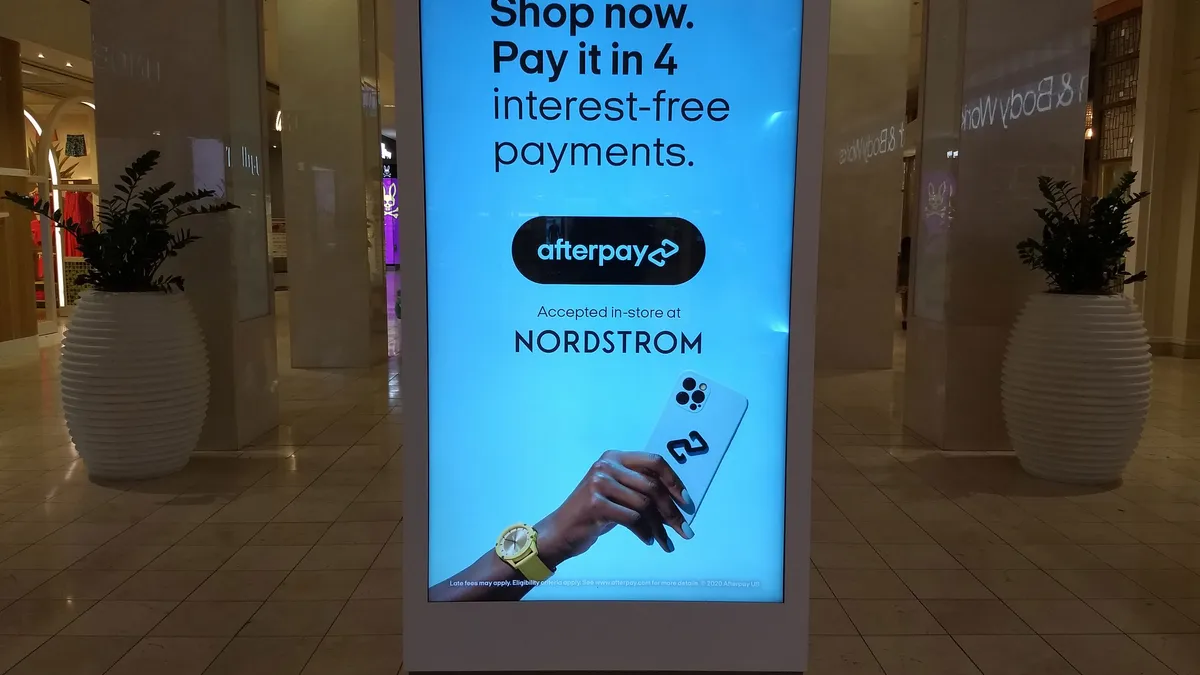Dive Brief:
- Consumer downloads of buy now, pay later apps fell for the second quarter compared to the year-earlier period – the third consecutive quarter of a year-over-year decline, according to a report published Friday by Bank of America Securities analysts.
- Average daily BNPL app downloads globally for that quarter declined 22.8% year-over-year, to about 104,000, the report said.
- On a total basis, U.S. BNPL downloads for the second quarter fell 19%, relative to the year-earlier period, to 5.51 million, analysts wrote.
Dive Insight:
After exploding in popularity during the COVID-19 pandemic, BNPL providers now operate in an environment made more challenging by higher interest rates, less plentiful venture capital and investors’ desire for profits. Companies offering these installment loans have sought to control costs by cutting staff or shuttering operations in some markets, as they pursue additional revenue streams and new users.
“While the BNPL industry is macro-sensitive, we believe the category is here to stay, given a meaningful value proposition for certain consumers and merchants,” Bank of America analysts wrote in Friday’s note. Bank of America tracked app downloads and monthly active users for the BNPL providers Affirm, Afterpay, Klarna, Sezzle and Zip.
For San Francisco-based provider Affirm, global daily downloads fell 5.7% for the quarter on a year-over-year basis. It was “the first decline since we began tracking in 2018,” Bank of America analysts noted with respect to that company.
Sweden-based Klarna saw the largest drop in global daily downloads for the quarter, with a 38.1% year-over-year plunge. Australian Afterpay, owned by digital payments company Block, was the sole BNPL provider to experience growth in daily downloads globally for the quarter, increasing 9.2% year-over-year.
The Bank of America data adds to other findings that the BNPL industry is currently seeing more growth from repeat users than newcomers. About one-quarter of the U.S. population has tried BNPL, according to LexisNexis Risk Solutions data shared with Payments Dive
In the U.S., Affirm surpassed Klarna as the most downloaded BNPL provider. However, Klarna, the oldest of the BNPL providers, continued to be the most frequently downloaded BNPL app globally during the quarter: Klarna notched 4.43 million downloads, followed by Afterpay with 2.23 million, Affirm with 1.68 million, Australian Zip with 743,000 and Minneapolis-based Sezzle with 355,000, according to the report.
Despite declines in app downloads, the number of monthly active users is still growing for BNPL providers. Those figures grew year-over-year both in the U.S. and globally, analysts wrote.
On the monthly active user front, Klarna remained the most popular BNPL provider globally, responsible for 58% of monthly active users, or 14.75 million. It was followed by Afterpay at 22.8%, or 5.8 million; Affirm with 13.1%, or 3.33 million; Zip at 4.4%, or 1.11 million; and Sezzle with 1.7%, or 428,000, analysts wrote.
Monthly active users refers to the number of customers who open the app at least once during a month. Growth in active user bases was led by Affirm, which experienced an increase of 27.3%, followed by Afterpay at 17.7%, Klarna with 12.5%, and Sezzle at 10%, analysts said.
In the U.S., Afterpay was the most frequently used BNPL provider during the quarter, averaging 4.23 million monthly active users, Bank of America analysts said. “This marks the 12th consecutive month (where) Afterpay has been the most frequently used BNPL provider in the US,” analysts wrote.
But other analysts question Afterpay’s growth trajectory and whether the purchase of that BNPL company is paying off for parent company Block.
“Afterpay growth has slowed dramatically over the past year, and we are concerned the Afterpay acquisition was an ‘unforced error’ of sorts,” William Blair analyst Robert Napoli wrote in a Wednesday report to investor clients.
When Block announced in August 2021 that it was acquiring Afterpay in an all-stock deal, Block’s share price valued the BNPL company purchase at $29 billion, but by the time the deal closed in January 2022, the price tag was only $13.9 billion. Ultimately, Block “vastly overpaid” for Afterpay, Napoli said during a Friday interview.
In the BNPL space, “we’re just very intrigued to see how the profit model sorts out as the industry matures, and, importantly, goes through a challenging macro cycle,” Napoli said. Growth in the sector has clearly slowed but “it’s holding up a little bit better” than some may have thought, he added.
The profit model for BNPL “is in flux, it’s still not clear,” he said. Block executives “really haven’t given their view on what exactly their profit model is for Afterpay.”











